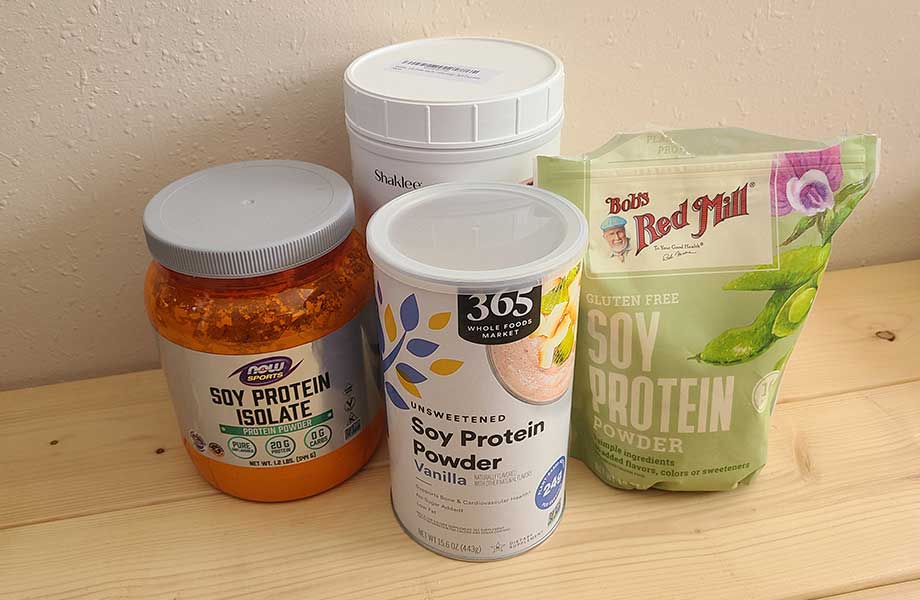We test and review fitness products based on an independent, multi-point methodology. If you use our links to purchase something, we may earn a commission. Read our disclosures.
Plant-based eating offers many potential health benefits, hence its ever-growing popularity. Still, a plant-based diet requires a conscious effort to maintain adequate protein intake and meet your daily protein needs. Enter plant-based protein powders. Whether you follow a vegan diet or want to harness the power of the plant for your health goals, soy protein powder can be a valuable addition to a well-balanced diet.
RELATED: Plant-Based Protein Powder Benefits
In our quest to find the best soy protein powder, we tried dozens of products, putting them to the test objectively and subjectively. We tested as certified personal trainers, registered dietitian nutritionists, athletes, and coaches. We analyzed each product’s formula, taste, solubility, price, and more to compile a list of the best soy protein powders to support your health and wellness goals.
Medical disclaimer: This article is intended for educational and informational purposes only. It is not intended as a substitute for medical advice. For health advice, contact a licensed healthcare provider.
Best Soy Protein Powders
- Best Overall Soy Protein Powder: Bob’s Red Mill Soy Protein
- Best Budget Soy Protein Powder: Bulk Supplements Soy Protein Isolate
- Best Soy Protein Powder for Athletes: 365 Everyday Soy Protein
- Best Chocolate Soy Protein Powder: Shaklee Chocolate
- Best-Tasting Soy Protein Powder: NOW Sports Soy Protein
- Best Gluten-Free Soy Protein Powder: Naturade Total Soy
Best Overall Soy Protein Powder: Bob’s Red Mill Soy Protein
Good for: vegans with gluten intolerance
Best Overall
Bob’s Red Mill Soy Protein
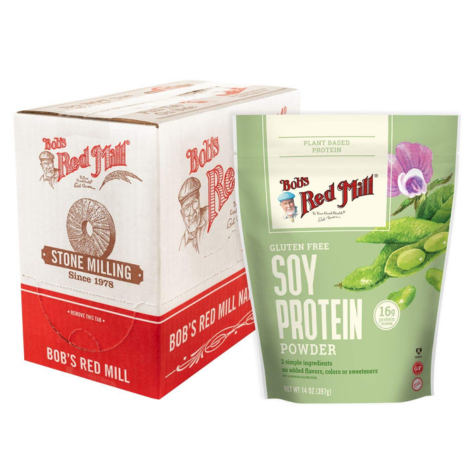
Product Highlights
- Soy protein powder
- Vegan- and Keto-friendly
- Gluten-free
- Unflavored formula
- 17 g of protein per serving
- 70 calories
Pros & Cons
Pros
- Contains two ingredients
- Good for baking
- Ideal for low-calorie diets
Cons
- Some customers say it’s gritty
- Almost $2 per serving
- No flavors
Bottom Line
Bob’s Red Mill Soy Protein is ideal for vegans looking for a soy protein isolate. This unflavored protein powder can be used in smoothies, oatmeal, baked goods, or pancakes. It provides 17 grams of protein per serving and only 1 gram of fat and carbohydrates per serving.
Bob’s Red Mill Soy Protein Powder took home MVP for our list of the best soy protein powders. It’s a complete protein made from just two ingredients—isolated soy protein and soy lecithin. And it’s all packed into a convenient and versatile vegan protein powder.
Bob’s Red Mill Soy Protein Powder is gluten-free, kosher, and keto-friendly, with the certifications and manufacturing facility to prove it. Bob’s Red Mill utilizes a separate 100% gluten-free facility to manufacture its soy protein powder. It’s also dairy-free, unflavored, and unsweetened, prioritizing high-quality, non-GMO ingredients. Each serving of Bob’s Red Mill Soy Protein Powder contains 16 grams of protein and just 80 calories.
Out of a potential 5, Bob’s Red Mill Soy Protein Powder scored a 3.9 overall. Frieda Johnson, GGR editor, tested this protein powder herself. It has a lower protein content per serving than other kinds, hence the 2.75 score for formulation, however, at just $0.55 per serving, she gave it a perfect 5 for price. Frieda points out that the low cost allows flexibility in serving sizes:
“The price is great! You do only get 16 grams of protein, but for the price you could double the serving size for twice the protein and it would still cost less than many competitors,” she says.
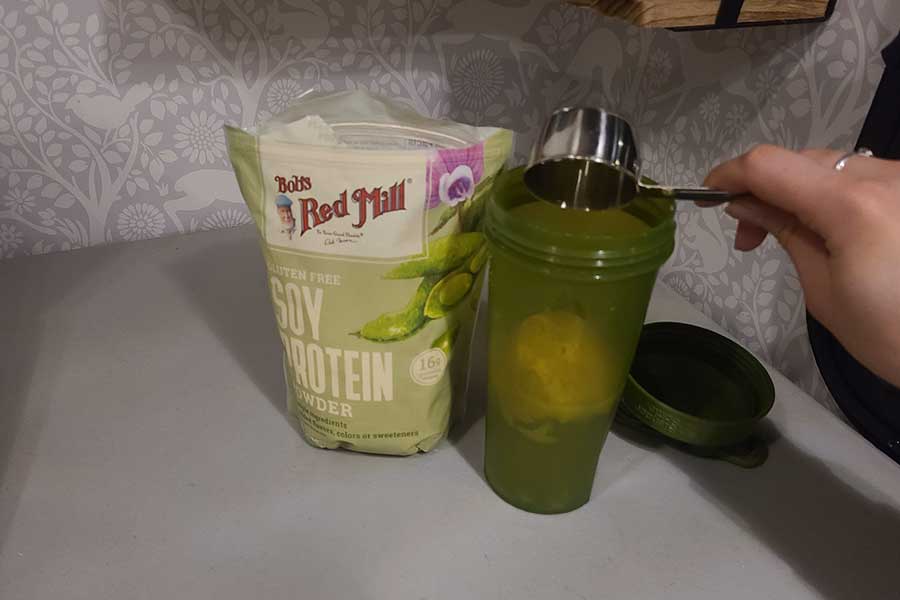
Solubility also scored well, with a 3.5 out of 5. Frieda found that it blended well, with only a few small floating pieces and a little sediment at the bottom. The flavor didn’t fare quite as well for this protein powder, as Frieda found it to be slightly bitter and gave it a 2.5 out of 5 for taste.
“It has a bit more of a bitter taste than some other unflavored soy proteins I’ve tried,” she says. “It’s not something I would want to just drink plain, but mixed with other things in a smoothie it’s more palatable.”
| Protein Per Serving | 16 g |
| Price Per Serving | $0.55 |
| Flavors | Unflavored |
| Third-Party Tested? | No |
Best Budget Soy Protein Powder: Bulk Supplements Soy Protein Isolate
Good for: athletes on a budget
Best Budget
Bulk Supplements Soy Protein Powder
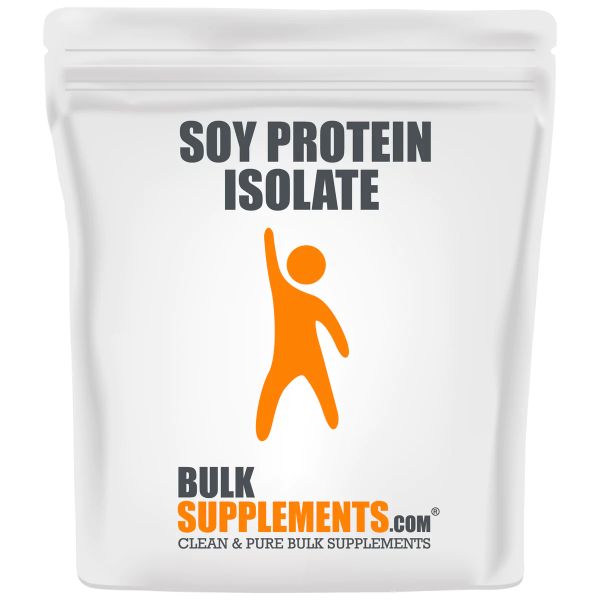
Product Highlights
- Soy protein powder
- Manufactured in FDA-registered and inspected facility
- Unflavored
Pros & Cons
Pros
- Cheap at $0.82 per serving
- Third party-tested
- Multiple sizes offered
- Unflavored
Cons
- Makes mess when you open bag
- Customers state doesn’t blend well
- Doesn’t come with a scoop
- No flavored options
Bottom Line
Bulk Supplements Soy Protein Powder is a cheap vegan protein option, but reviewers share it isn’t the best-tasting option. There are no flavors available, but if you're looking for a protein powder to bake with, or one you can easily blend into smoothies, this could be a good option.
When it comes to the price per gram of protein, Bulk Supplements’ Soy Protein Isolate takes the win. Each serving provides 25 grams of protein for only $0.64 when purchased in bulk. Derived from soybeans, this supplement is 90% protein by weight. However, it does contain 4 grams of carbohydrates per serving, contributing to the 90 calories found in each 30-gram scoop of protein powder.
It boasts an impressive branched-chain amino acid profile, including all essential amino acids. This soy protein isolate powder is considered a complete protein, making it a game-changer for those pursuing lean muscle mass.
Bulk Supplements Soy Protein Isolate is a gluten and lactose-free protein supplement, making it an optimal choice if you are gluten or lactose-intolerant. It is also free from additives and tested by a third-party lab for safety and quality.
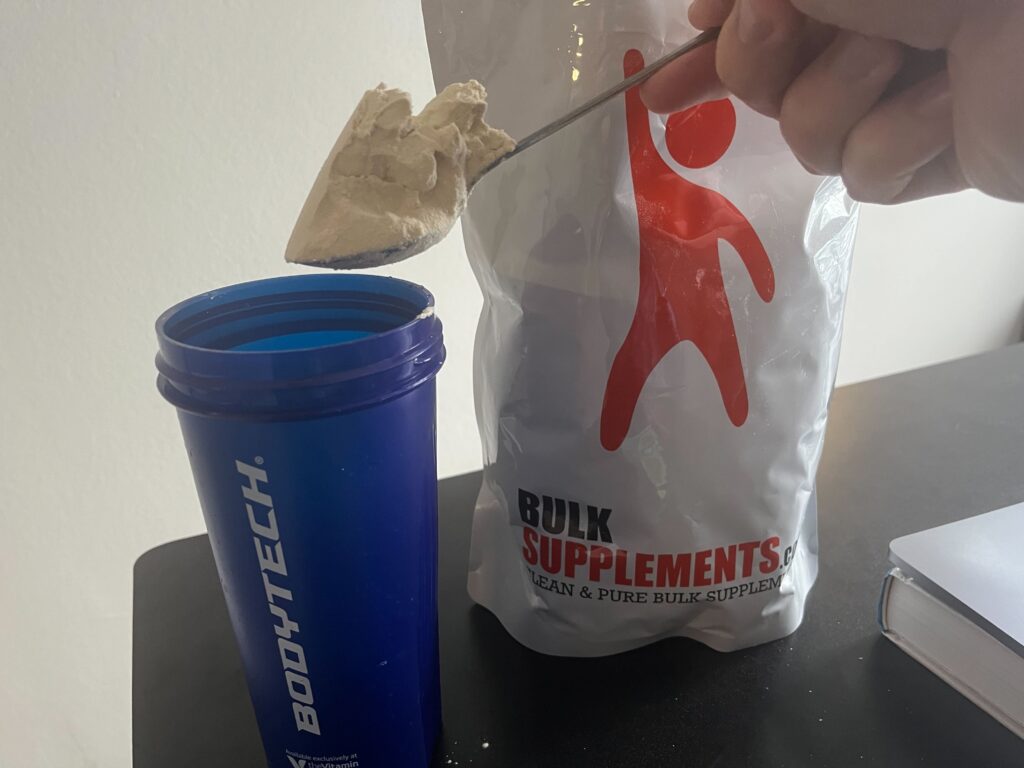
The sports nutrition supplement is only available unflavored, giving you the freedom to add ingredients and make your own great-tasting DIY protein shake. Its formula doesn’t include calcium, so you might consider mixing the protein powder with milk if tolerated. Of course, milk is another protein source, so be mindful of serving sizes to stay on track with your macronutrient goals.
| Protein Per Serving | 25 g |
| Price Per Serving | $0.64 (11-lb option) |
| Flavors | Unflavored |
| Third-Party Tested? | Yes |
Best Soy Protein Powder for Athletes: 365 Everyday Soy Protein
Good for: increased demands for muscle growth and recovery
Best for Athletes
365 Everyday Soy Protein
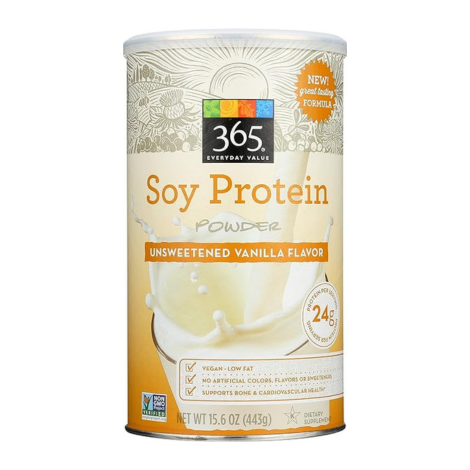
Product Highlights
- 24 g of protein per serving
- No artificial ingredients or sweeteners
- Low in fat and carbs
- Certified GMO-free, Vegan, and Kosher
Pros & Cons
Pros
- High-protein supplement
- Vegan-friendly
Cons
- Facility also processes tree nuts, milk, and eggs
- Over $2 per serving
Bottom Line
365 Everyday Soy Protein can be found on Amazon or directly from Whole Foods. It’s a soy-based protein powder ideal for vegans. It’s also certified non-GMO and Kosher. The downside is that it’s priced over $2 per serving.
Not all sports nutrition supplements can meet the demands of an athletic lifestyle. Muscle growth and recovery require high-quality protein sources, and while many athletes turn to whey protein powders, those who follow a vegan lifestyle will prefer soy protein. Whole Foods Market caters to athletes with increased protein needs with its 365 Everyday Value Soy Protein powder.
Based on its overall impression, 365 Everyday Value Soy Protein powder scored 3.25 out of a possible 5. Frieda Johnson, GGR editor, shared her experience:
“This has a stronger and more unpleasant flavor than I’d prefer for an unflavored protein powder, but not enough vanilla flavor to be considered flavored. I will likely use it in baking or smoothies to hide the flavor. Lots of protein, though, compared to other soy options.”
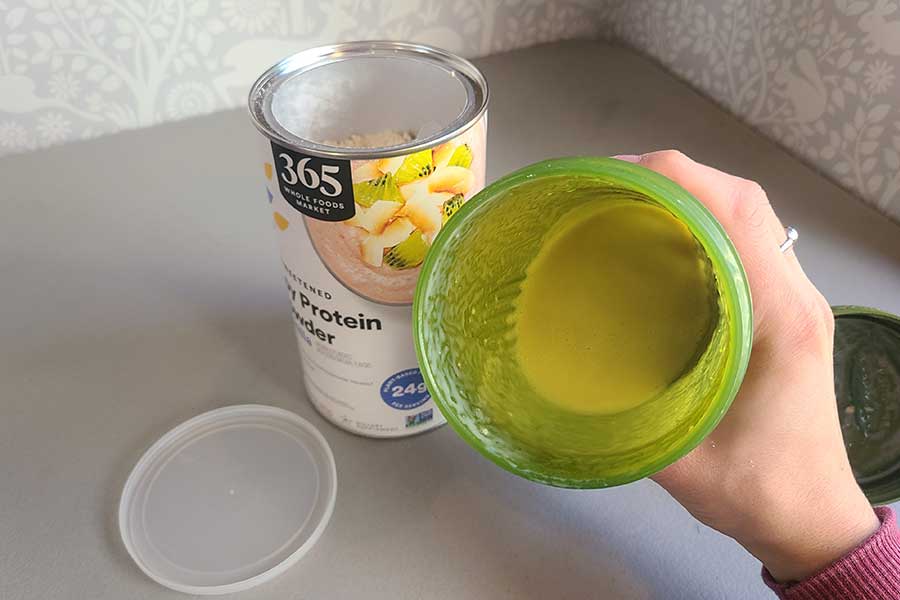
Its impressive formula earned an equally impressive score—4 out of 5. Each serving provides 24 grams of protein, 1 gram of fat, and less than 1 gram of carbs, totaling 110 calories. The protein powder is also a good source of important minerals, such as phosphorous, calcium, and iron, which support bone and cardiovascular health in athletes.
Unfortunately, its price isn’t competitive with the other protein supplements on this list. It runs about $2.62 per serving, which is why we gave it a score of 1 out of 5 for price.
Its unsweetened vanilla flavor earned a 2 out of 5. Frieda found the vanilla taste to be very faint.
“It claims to have vanilla flavor, but I can’t taste it at all,” she says. “Mixed in a shake with other ingredients it’s fine, but it is definitely not a protein powder I would drink plain. Solubility: It blends very well and has a creamy texture. I would definitely recommend mixing it with more water than the label says, though, because it is very thick.”
| Protein Per Serving | 24 g |
| Price Per Serving | $2.62 |
| Flavors | Unsweetened Vanilla |
| Third-Party Tested? | No |
Best Chocolate Soy Protein Powder: Shaklee Life Shake Chocolate
Good for: chocolate lovers who need to up their protein intake
Best Chocolate
Shaklee Life Shake Rich Chocolate
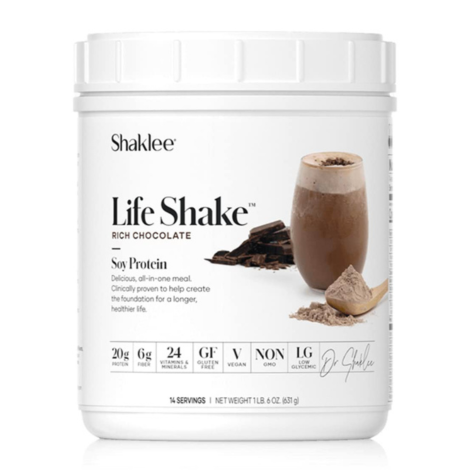
Product Highlights
- Plant-based meal replacement shake
- 20 g of protein per serving
- 24 vitamins and minerals
- 160 calories
- Gluten-free
- Organic
Pros & Cons
Pros
- 24 vitamins and minerals
- Contains 6 grams of fiber
Cons
- Over $3 per serving
- 2 scoops per serving
- Protein could be higher for meal replacement shake
- 160 calories doesn’t equal a meal
Bottom Line
Shaklee Chocolate is an organic, plant-based meal replacement shake. It has all three macronutrients to make a complete meal with 20 grams of protein, 4 grams of fat, and 15 grams of carbohydrates. However, it only contains 160 calories, which is not enough to be considered a true meal replacement.
The Shaklee brand highlights sustainability, science, and health with its products. Typically, we’d be all over that. However, some health markers fall short with the Life Shake Soy Protein powder. Frieda Johnson, GGR editor, said it best:
“I really like the brand’s focus on sustainability, but this is marketed as a meal replacement shake and it only has 160 calories! That’s fine for a protein shake, but not OK for a meal replacement.”
A protein shake with only 160 calories cannot match the nutritional content of a full meal. It has good protein and vitamin content, but the fat and carb content is much too low to be considered a meal replacement. Since it’s categorized as a meal replacement, it scored 2.5 out of 5 for formulation.
And at $3.89 per serving, its price leaves you wanting a bit more. If it were a true meal replacement shake, there would be a little less sticker shock. However, as a protein shake, its price gets a 2 out of 5 from us.
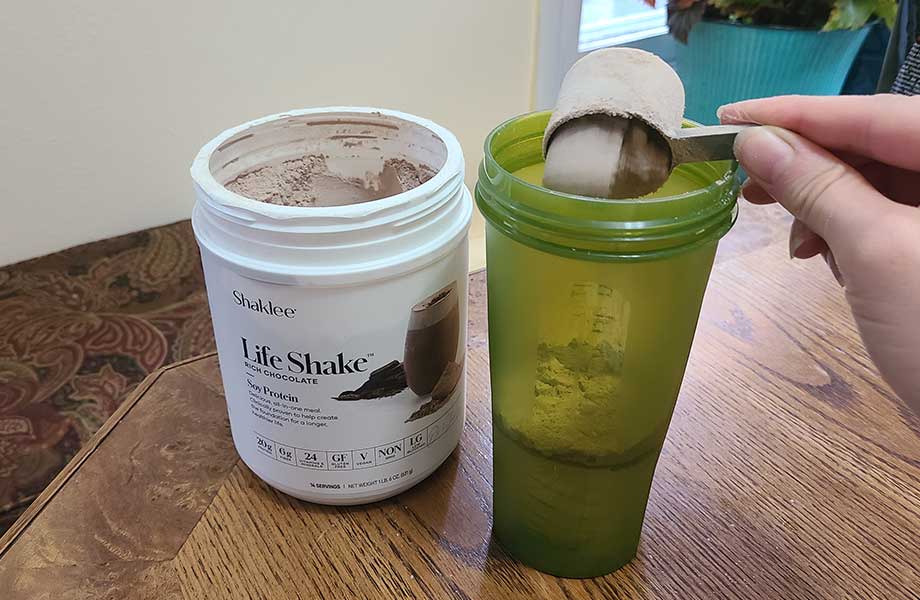
Shaklee Life Shake is available in French vanilla, rich chocolate, cafe latte, and strawberry. Frieda tried the chocolate flavor and shared high praise, giving it a 3.5 out of 5. “It’s pretty good; it actually tastes like chocolate and isn’t too sweet or artificial tasting. The soy protein flavor comes through a bit, but it’s not overpowering.”
Solubility faired well, too, scoring 3 out of 5. “When using the minimum amount of liquid recommended it’s a bit thicker than I prefer, but it’s still drinkable. I didn’t notice any settling or grittiness,” Frieda mentions.
Frieda did experience some mild GI distress after drinking her Shaklee protein supplement, causing her to rate the shake a 3 out of 5 for side effects.
| Protein Per Serving | 20 g |
| Price Per Serving | $3.89 (Based on the company website, as Amazon is sold out) |
| Flavors | French Vanilla, Rich Chocolate, Cafe Latte, Strawberry |
| Third-Party Tested? | No |
Best-Tasting Soy Protein Powder: NOW Sports Soy Protein
Good for: individuals who want to switch up the taste every now and then
Best Tasting
NOW Sports Soy Protein
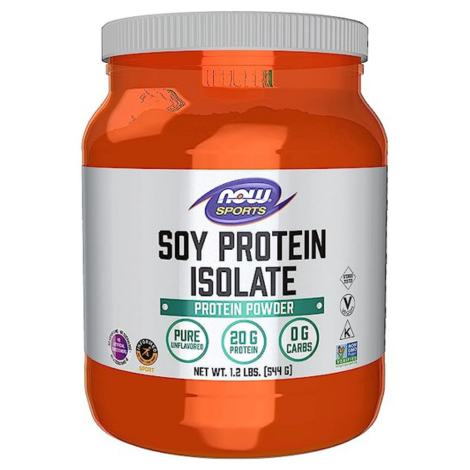
Product Highlights
- Soy protein isolate
- Unfavored powder
- Informed Sport tested
- Kosher, Vegan, and non-GMO
- 20 g of protein per serving
- GMP quality assured
Pros & Cons
Pros
- No artificial ingredients or sweeteners
- Non-GMO soy
- One-ingredient protein powder
Cons
- Unflavored protein can be strange-tasting
- May be better for baking than shakes
Bottom Line
NOW Sports Soy Protein features only one ingredient: soy protein isolate (from non-GMO soy). This unflavored powder can be added to smoothies or used in baking. It’s also priced under $1 per serving.
Now Foods hit it out of the park with its Sports Soy Protein powder. It earned an overall high score of 4.1 out of 5, with high marks for its price, taste, and solubility.
At just $0.53 for each 20-gram serving of protein, it earned a whopping 5 out of 5 for price. Frieda Johnson, GGR editor, gave it a 3 out of 5 for taste and a 4 out of 5 for solubility:
“For an unflavored soy protein powder, this is about what I’d expect. It’s not something you’d want to drink plain, but it has a mild enough flavor to mix well into smoothies. It blends well and has a smooth texture, although it gets a little foamy and there was a small bit of settling. I mixed it with about 10 ounces of water and it wasn’t too thick.”
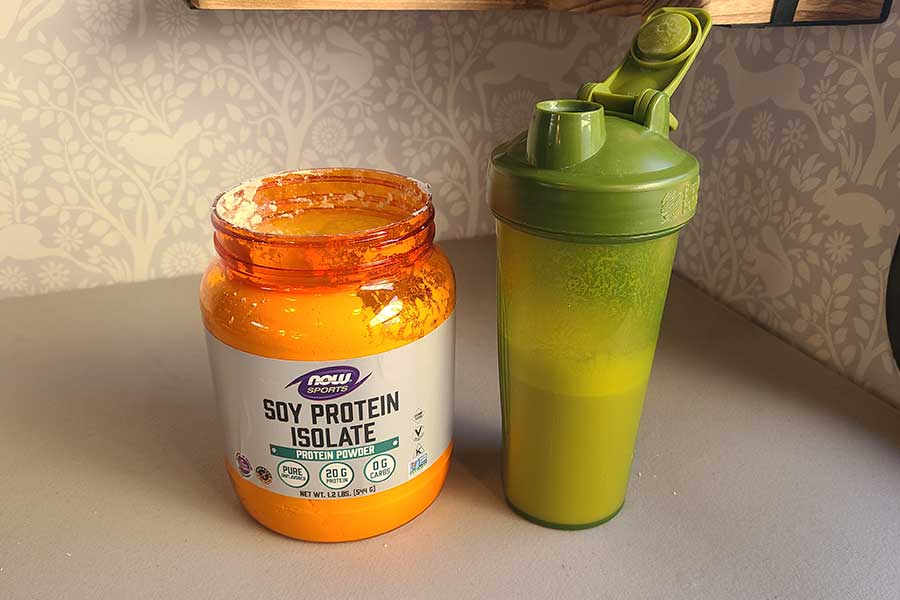
This unflavored protein powder is like a blank canvas. Depending on your preferences, you can drink it in a small cup of soy milk or fix up a decadent smoothie with fresh fruit, veggies, and stevia. The possibilities are endless; you’ll never get bored with your protein shake’s taste!
RELATED: Protein Smoothie Recipes
| Protein Per Serving | 20 g |
| Price Per Serving | $0.53 |
| Flavors | Unflavored |
| Third-Party Tested? | No, in-house testing |
Best Gluten-Free Soy Protein Powder: Naturade Total Soy
Good for: individuals with celiac disease or gluten intolerance
Best Gluten-Free
Naturade Total Soy
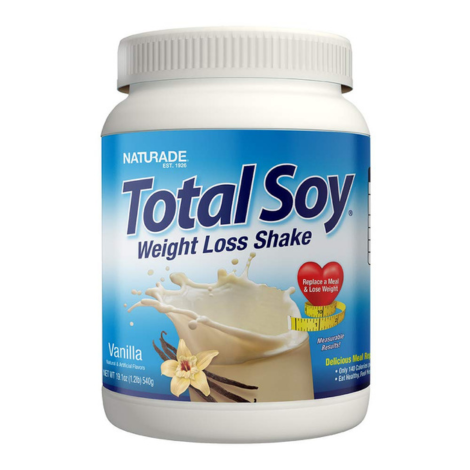
Product Highlights
- Soy meal replacement shake
- 13 g of protein per serving
- 140 calories per serving
- 24 vitamins and minerals
- Gluten-free
- Lactose free
Pros & Cons
Pros
- Non-GMO soy
- About $1 per serving
- Sweetened with cane sugar
Cons
- 140 calories is too low for a meal
- 13 g of protein is fairly low
- Carbohydrate content almost outshines protein
Bottom Line
Naturade Total Soy is a meal replacement shake formulated from non-GMO soy. While all three macronutrients are present for a meal replacement shake, the calorie content is too low to be considered a true meal replacement. On Amazon, this meal replacement shakes comes in several different container sizes including 15- and 30- serving containers.
In our search for the best soy protein powder, Naturade Total Soy made the cut as the best gluten-free soy protein powder. Out of a possible 5, it scored 3.56 overall, with its most significant deductions coming from taste and formulation.
Erin Chancer, GGR senior editor and certified nutrition coach, tried Naturade Total Soy and shared her experience:
“This was not the most pleasant experience all around. To start, this shake only contains 13 grams of protein per serving with 15 grams of carbs and 8 grams of added sugar.”
Those carbs and the added sugar detract from the primary focus of the dietary supplement—to increase protein intake. Therefore, the formulation scored a 2 out of 5.
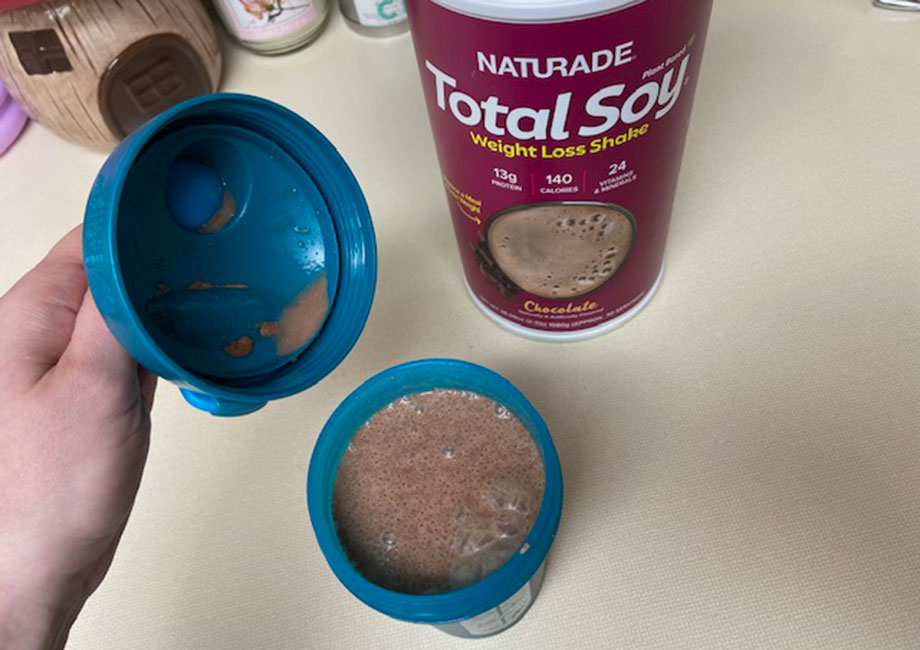
Erin went on to say, “I also don’t love the branding as a weight loss shake. It says, ‘Replace a meal & lose weight’ on the bottle. However, there are instructions/steps on the label to only replace one meal and still eat a well-balanced diet and exercise. I could see losing weight using this shake only because it would kill my appetite.”
RELATED: Is Protein Powder Good for Weight Loss?
Naturade Total Soy didn’t fare well in the taste category, scoring 1.75 out of 5. “Oh boy, I’d liken it to chocolate-flavored Playdough (I don’t eat a lot of Playdough, that’s just what came to mind.) The more I drank it (for Science) the more I got used to the flavor. That said, I doubt I’ll continue to use this,” shared Erin.
Solubility scored better, with a 4.5 out of 5. Erin found that the powder dissolved and mixed well in the shaker cup with a whisk ball, and it didn’t appear to clump up when sitting. If you’re on the fence about trying Naturade Total Soy, its price scored 4.8 out of 5, making it an affordable trial run.
| Protein Per Serving | 13 g |
| Price Per Serving | $0.91 |
| Flavors | Vanilla, Chocolate, Horchata |
| Third-Party Tested? | No |
Can You Build Muscle with Soy Protein Powder?
You bet! Soy protein is a complete protein, meaning it contains all the essential amino acids our bodies can’t produce independently. And since amino acids are the building blocks of protein, they play a crucial role in muscle protein synthesis and muscle growth.
Soy protein powder is known for its extensive amino acid profile, including branched-chain amino acids like leucine. While whey protein powders earn high praise for their high BCAA content and rapid absorption, they’re made from milk and not appropriate for vegans.
What Happens If You Eat Too Much Soy?
The current Recommended Dietary Allowance (RDA) for protein is a very modest 0.8 grams per kilogram of body weight. However, 2018 research1 shows that our protein needs are actually much higher. Depending on medical history and physical activity levels, we may need at least 1.2-1.5 grams of protein per kilogram of body weight.
RELATED: How Much Protein Do I Need?
Studies2 have also shown that long-term intake of 2 grams per kilogram of body weight is generally safe for the average healthy adult. However, chronic high protein intake may contribute to renal, digestive, and vascular abnormalities.
Protein needs are very individualized, so it’s best to seek guidance from a registered dietitian to understand your nutrition demands and design a meal plan that supports your health goals.
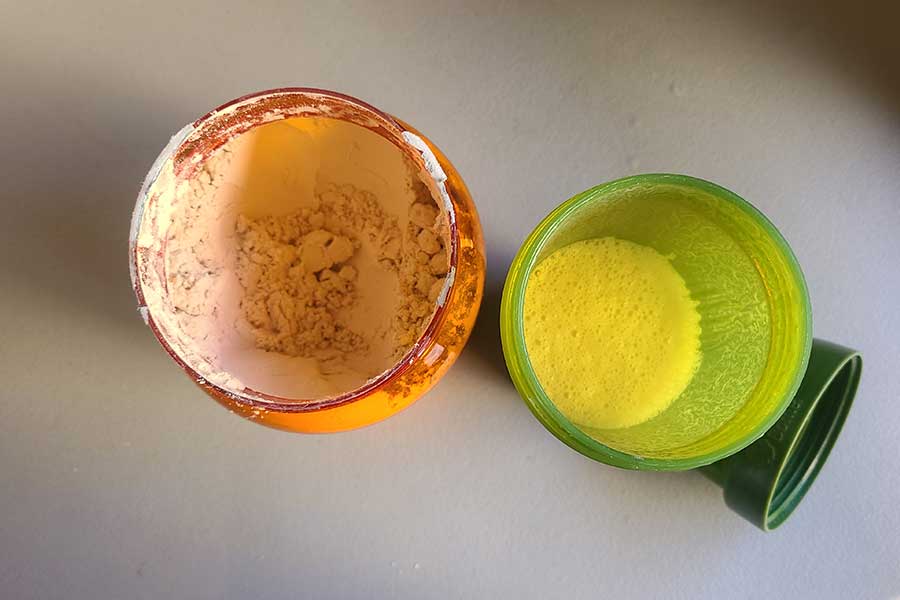
Who Shouldn’t Take Soy Protein Powder?
Soy protein powder may not be the right choice for everyone. Those who may not benefit from soy protein powder include:
- People with an iodine deficiency: Research3 points to a negative relationship between soy and thyroid function in those who are iodine deficient. If you are managing an iodine deficiency, consider an alternative vegan protein supplement.
- People with kidney disease: Eating too much protein can tax the kidneys, which filter waste products out of the body. Since protein powders are very protein-dense, meaning they contain a lot of protein in a small amount, consuming more than you need is easy. Your registered dietitian nutritionist can help implement protein powders into your renal-friendly diet.
- Pregnant women: Protein needs are elevated during pregnancy, but research regarding soy isoflavones and fetal health is lacking. Many obstetricians recommended avoiding soy protein powders during pregnancy.
- Sedentary individuals: If you are sedentary or minimally active, you are more likely to meet your protein needs through whole foods alone. Overconsumption by way of protein shakes can contribute to weight gain and resulting health concerns.
Soy Protein vs Whey Protein
Soy protein and whey protein are both popular dietary supplements that provide rich sources of protein. However, they both have unique characteristics that set them apart.
RELATED: Alternatives to Whey Protein
Soy protein is a plant-based protein that contains all essential amino acids, making it a complete protein. It’s typically suitable for those who follow a vegetarian or vegan lifestyle, and it offers several potential health benefits. For example, research published by Critical Reviews in Food and Science Nutrition4 has linked isolated soy protein and isolated soy isoflavones with improved triglyceride and cholesterol levels.
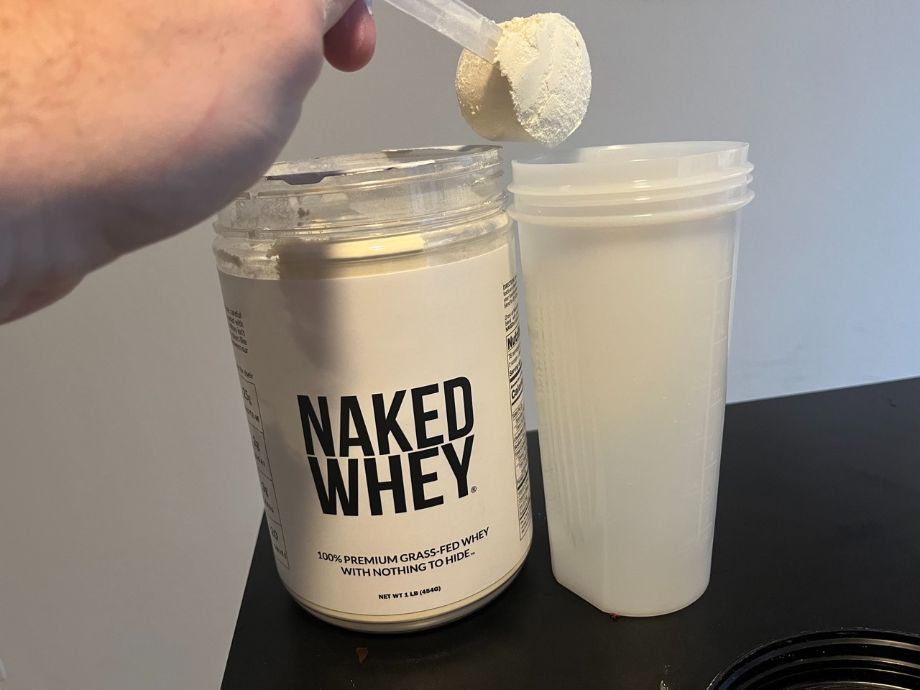
Whey protein is a byproduct of cheese production, so it’s not vegan-friendly. Since whey protein is a complete protein sourced from milk, it’s rich in branched-chain amino acids that support muscle protein synthesis necessary for post-workout recovery. For this reason, it’s a popular protein powder among athletes and gymgoers in pursuit of lean muscle mass. However, those with a lactose intolerance may not be able to consume whey protein shakes comfortably.
How We Picked and Tested the Best Soy Protein Powders
When we pick and test protein powders, we analyze them objectively and subjectively. Professionally, we’re a team of certified personal trainers, registered dietitian nutritionists, athletes, and coaches. But at the same time, we’re also just humans trying to be the healthiest version of ourselves despite various life circumstances.
Our reviews break down the science behind a product’s claim while keeping a realistic point of view about its potential in everyday life. To find the best soy protein powders and fully understand their potential, we considered multiple factors, including formulation, price, taste, and more.
Benefits of Soy Protein Powder
Soy protein is a complete protein that contains all nine essential amino acids, which is more than many other plant-based proteins. In addition to being a good source of protein, soy protein powder can offer many health benefits.
Can Support Cardiovascular Health
Soy contains compounds that can support heart health. A 2019 meta-analysis5 has shown that soy can lower LDL (bad) cholesterol and increase HDL (good) cholesterol levels. Since blood fats can contribute to heart disease and the risk of stroke, soy protein powder can be beneficial for heart health.
Soy also contains antioxidants that can fight against radicals that damage blood vessels and contribute to heart disease.
Helps Build Muscle
Soy protein powder can support muscle growth through its role in muscle protein synthesis. Soy protein contains all nine essential amino acids that our bodies cannot produce on their own. And since those amino acids are needed for muscle growth and recovery, soy protein powder can be a key player in helping you meet your fitness goals. This can be especially beneficial for those who don’t consume animal products.
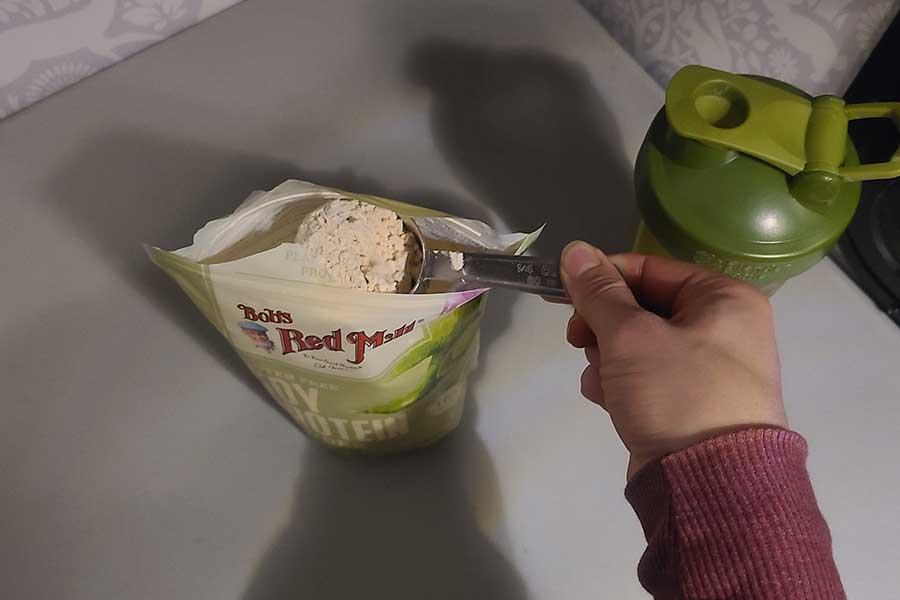
RELATED: How to Build Muscle
May Contain Vitamins and Minerals
Many soy protein powders contain additional nutrients like calcium, vitamin D, phosphorus, and potassium. Adding a protein powder can help you meet your micronutrient needs while increasing your protein intake daily.
Buying Guide: What to Look for in Soy Protein Powder
Nutrition needs vary between individuals. That’s why our testers come from all walks of life and fitness backgrounds. As we tested these sports nutrition supplements, we created a list of factors to consider when shopping for the best soy protein powder.
Formula
A soy protein powder’s formulation is key to its quality and potential impact. We examined the protein content and compared it to the other nutrients in the product. What does your money buy when you purchase this product?
In addition to its protein, we considered its carbohydrate, fat, vitamin, and mineral content. We closely reviewed the ingredients, sweeteners, and preservatives used, and any potential allergens. There is no one-size-fits-all soy protein powder, so it’s about finding the one that meets your needs and is worth the cost.
Price
Budget is a major factor when it comes to finding a suitable protein powder. Consistency is key for achieving muscle growth and efficient post-workout recovery, so you likely want to look for a protein powder that you can consistently consume as part of your fitness routine. We analyzed the price based on the protein per serving and other purported health benefits that the protein powder may or may not offer.
Taste
Besides the nutritional content of a soy protein powder, taste might be the next most important factor in choosing the right supplement for your needs. If you don’t care for the taste of your protein shake, you’re less likely to consistently consume it. And if you can’t drink it, you can’t take advantage of potential benefits.
We considered our own personal experiences with the protein powders we tried, as well as the flavorings used. We made note of artificial flavors and sweeteners that could affect the overall taste of the product.
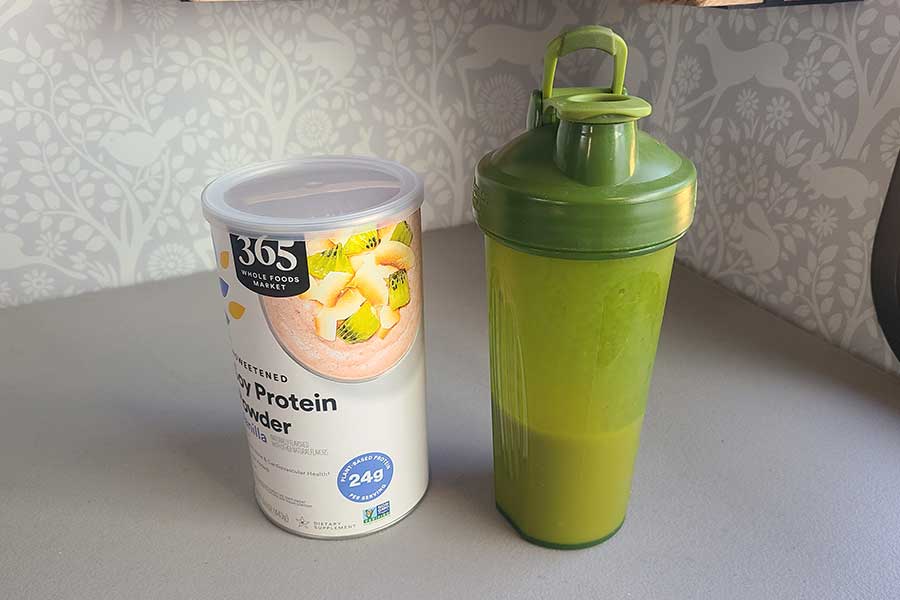
Side Effects
Side effects can be a significant deterrent for soy protein supplements. Protein powders have been known to cause gastrointestinal upset in some people, especially those made with artificial sweeteners. We carefully observed how the products we tested affected our systems positively and negatively. If we experienced unwanted side effects, we relied on our expertise and certifications to pinpoint the reasoning.
Third-Party Testing
It’s important to remember that the FDA does not regulate dietary supplements. Instead, it’s up to the supplement company to maintain quality and safety measures. Some companies rely on third-party testing to ensure there is no bias in the testing process. This can give the customer peace of mind that they are getting a safe and trustworthy product. We made note of whether or not a product has undergone third-party lab testing.
Best Soy Protein Powder: FAQs
Is soy protein powder good for you?
Yes, soy protein powder can be a beneficial addition to your well-balanced diet. It should not regularly replace meals, as it cannot satisfy all your nutrition needs, but it can help increase your protein intake to support muscle growth or weight loss.
Is it OK to drink soy protein every day?
Yes, consuming soy protein every day is generally considered safe for the average healthy adult. However, protein shakes should not regularly replace full meals. Talk with a registered dietitian to ensure your supplement routine doesn’t conflict with your overall health.
What are the best forms of soy protein to eat?
Whole soy foods, such as soy milk, tofu, tempeh, and soy bread, are typically nutritious forms of soy to eat. Make sure the soy foods are made with the whole soybean and not soy isolates.
Is soy protein powder better than whey?
Soy and whey protein both offer unique properties that can benefit overall health and fitness goals. For those who follow a plant-based diet, soy protein is an absolutely acceptable way to increase your protein intake between meals.
These statements have not been evaluated by the Food and Drug Administration. This product is not intended to diagnose, treat, cure, or prevent any diseases.
References
- Lonnie M, Hooker E, Brunstrom JM, et al. Protein for Life: Review of Optimal Protein Intake, Sustainable Dietary Sources and the Effect on Appetite in Ageing Adults. Nutrients. 2018;10(3):360. Published 2018 Mar 16. doi:10.3390/nu10030360
- Wu G. Dietary protein intake and human health. Food Funct. 2016;7(3):1251-1265. doi:10.1039/c5fo01530h
- National Center of Complimentary and Integrative Health. Soy.
- Moradi M, Daneshzad E, Azadbakht L. The effects of isolated soy protein, isolated soy isoflavones and soy protein containing isoflavones on serum lipids in postmenopausal women: A systematic review and meta-analysis. Crit Rev Food Sci Nutr. 2020;60(20):3414-3428. doi:10.1080/10408398.2019.1689097
- Blanco Mejia S, Messina M, Li SS, et al. A Meta-Analysis of 46 Studies Identified by the FDA Demonstrates that Soy Protein Decreases Circulating LDL and Total Cholesterol Concentrations in Adults. J Nutr. 2019;149(6):968-981. doi:10.1093/jn/nxz020
Further reading

I love a good showdown between two pieces of the best home gym equipment. It makes me feel like I'm John Cena or in the WWE. A man can dream, ok? Anyway, I’m sharing with you, the lovely readers of Garage Gym Reviews, my thoughts on two of the best adjustable dumbbells in the game: the Ironmaster Quick-Lock Adjustable Dumbbells and the PowerBlock USA Elite Series Adjustable Dumbbells.In this showdown, you’ll hear my thoughts on the great Ironmaster vs. PowerBlock debate and what I think you really need to know. Neither of these products are exactly monetarily equivalent to picking up a sausage biscuit at McDonald’s, so I know you want to get this purchase right. I’ll help by giving you all the details on price, warranty, customer reviews, and workout experience. Read more

Glutamine supplements can be found nearly anywhere that carries sports supps, but do they carry all of the claimed benefits? A registered dietitian answers. Read more

If you’re looking for a treadmill alternative, look no further—we have the best alternatives to treadmill workouts that aren’t any less effective. Read more

In this Nutricost BCAA Review, find out what our tester thought of this ultra-affordable branched-chain amino acid supplement. Read more

